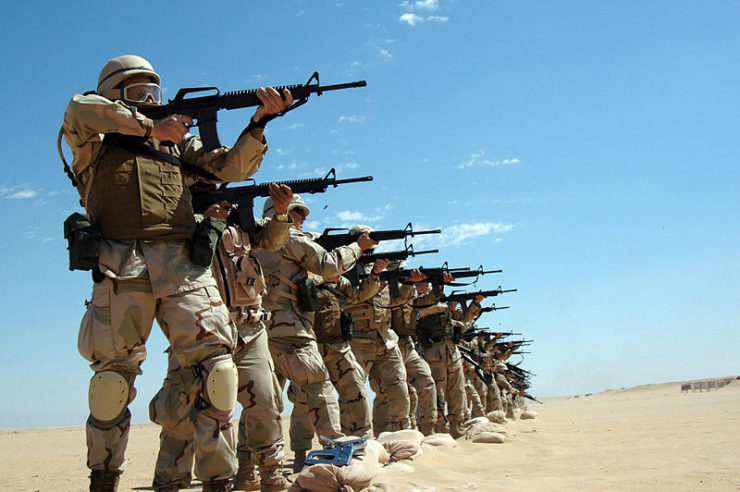
The events in Syria and in the areas surrounding it have led to many analysts somehow missing the sharp deterioration of the situation in Syria’s neighbor – Iraq, a country that possesses enormous reserves of oil and gas, a large territory and population, access to the Persian Gulf and a favorable geopolitical location at the crossroads of the Middle East. In addition, Iraq is largely the “key” to Iran. A government in Baghdad that was hostile to Iran would be a powerful tool for the United States and Saudi Arabia to apply pressure on Tehran. That is why in recent weeks, the activity of Washington, Riyadh, Doha and Kuwait in Iraq has increased substantially.
Apparently, not counting on Bashar al-Assad’s imminent resignation, at least until after the liquidation of his stockpiles of chemical weapons, the U.S.-Wahhabi coalition decided to get close to Iran in a more direct way – through neighboring Iraq, which now has a government coalition, which is friendly to Tehran, of Shiite parties led by Nouri al-Maliki. In this case, the emphasis is on inciting national and religious hatred in this country, where, along with the Arabs, Kurds and Sabaists reside Sunnis, Shiites, Christians, Yezidis, etc. And there are full inter-weaved ethno-religious differences, since both the Arabs and the Kurds are Christians, Shiites and Sunnis. The U.S.-Wahhabi axis is using Al-Qaeda terrorist elements, Sunni militants from al-Anbar province and former Baathists to achieve its goals.
Today, opponents of Iran have a well-defined task to achieve by destabilizing the political situation in Iraq, with terrorist activity and the fomenting of conflict between Sunni and Shiite: shake the foundations of the al-Maliki regime so that it voluntarily resigns and announces new elections, the holding of which Saudi Arabia and Qatar are willing to spend billions of dollars on. This may result in a significant number of radical Islamists, including those of the Salafi persuasion, entering the power structures of Iraq, primarily in its parliament. They will create chaos in the governing authorities of the country in order to cause the subsequent disintegration of Iraq into three enclaves – Shiite, Sunni and Kurdish. The United States and the Wahhabi monarchies of Arabia do not need a unified, powerful Iraq and the return of the Sunnis to power has been ruled out.
Apparently, this is all to take place during the planned parliamentary elections in Iraq in 2014. According to Arab sources, under the leadership of the CIA there has begun coordination of the intelligence services of Saudi Arabia, Qatar, Kuwait and Turkey on the issue of the consolidation of the jihadists and Baathists of all stripes into a united front, which should bring down the government and al-Maliki. In other words, an already familiar variant. It worked in Libya and is now actively being implemented in Syria. The main thing is to dispose of the regime, and it is all the same who will be the dominant force in the opposition. Arab countries, especially Qatar, would prefer to see Salafis in Baghdad, while Turkey and Saudi Arabia – moderate Islamists, if they can find any there in Iraq. The United States would have preferred a variant of secular liberals, but almost no liberals remain in Iraq because of short-sighted policies of Washington during the American occupation of the country. An agreement in principle has been reached and it has even started to be put into place. For example, the recent assassination of prominent political figures who could run for governors of leading provinces. In October this year, moves are expected to begin to remove from the political scene a number of parties and leaders who can in some way compete in the upcoming elections in Iraq. At the same time, as a result of financial flows from Arabia, the process has begun of creating new parties and movements that are designed to unite the former Baathists and moderate Islamists. The plans of the regional security services also include the organization of mass killings of civilians and the carrying out of acts of sabotage at oil sector and power facilities with the aim of weakening the economic foundations of the regime and creating an atmosphere of discontent among the inhabitants due to the country’s authorities’ current inability to suppress terrorist activity.
Unfortunately, the government of al-Maliki is not showing any flexibility, responding with the most stringent methods to the acts of those who do not belong to the militants, but would like a normal life. This repression is even applied to peaceful protests with purely economic demands. In addition, hostility to neighboring Kuwait is being stoked, which is put on a par with the Wahhabi regimes Saudi Arabia and Qatar. Attacks on Turkey are being allowed to happen, although it is actively opposed to plans to create a Kurdish autonomous region from unified Iraq.
In this regard, there is hope that Tehran would apply a correcting influence on Baghdad, prompting it towards reconciliation, not to foment civil conflict on ethno-religious grounds. However, we can not exclude that given the incipient rapprochement between Iran and the United States, Tehran does not want to actively get involved in Iraqi affairs. It is, in fact, more important for Iran to solve its own problems, not to open another “battle front” with the United States, Saudi Arabia and Qatar in Iraq as well. For now, all Iran’s forces, including its Islamic Revolutionary Guard Corps, are being used to save the Assad regime and support the Hezbollah.
In any case, the coming months could be crucial in determining the future structure of Iraq and save it as a single state. Otherwise it will collapse, its Sunni enclave will be Islamized along Salafist lines, and the final separation of the Kurdish provinces from the Iraqi state will take place.
Viktor Titov, Ph.D. (Candidate of Historical Sciences), is a political commentator on the Middle East. Exclusively for the New Eastern Outlook online journal.
